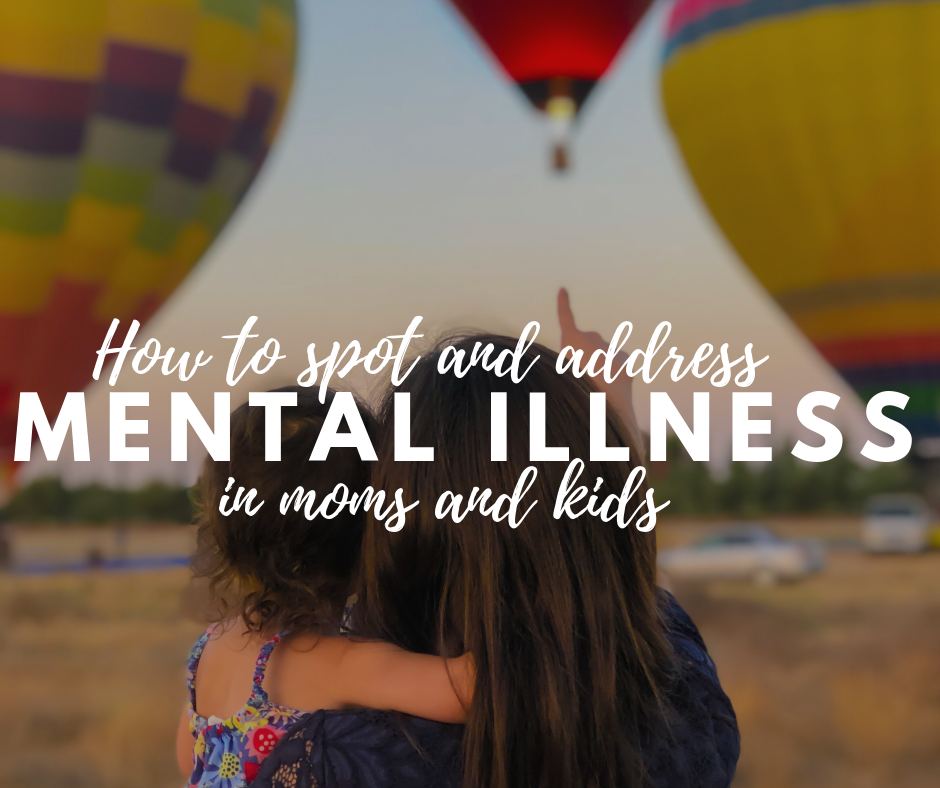How To Spot And Address Mental Illness
In Moms And Kids
This is Part 2 of a two-part interview on mental health with Dr. Liz. See the last one here.
In the last post, we started an open dialogue around mental health – stigmas around the topic, common misconceptions, and how to proactively build and maintain it. In this post, I talk to Dr. Liz about the topic of mental illness: what are common illnesses in moms and kids, how to recognize signs, and strategies to address them.
To start, what’s the difference between mental health and mental illness?
Mental health is helping yourself function well in your role as a mom, spouse, friend, employee, etc. Taking care of your mental health can include meditation, prayer, exercise, or connecting with a friend, any activity that keeps you feeling grounded and supported.
Mental illness, on the other hand, is diagnosable based on symptoms that impair you from functioning and living well.
What common mental illnesses affect moms specifically as well as kids?
1 in 7 mothers experience depression or anxiety during pregnancy or postpartum.
Postpartum depression has gotten a lot of media recently as women are speaking out, including celebrities such as Chrissy Teigen, Brooke Shields, and Gwyneth Paltrow. It’s exciting to see the conversation go mainstream because it’s shedding light on things people hadn’t previously talked. This is driving awareness that the issue is common and reducing the stigma around it. Motherhood is really difficult and a huge transition. There’s a normal aspect of grieving and learning how to do things in a very different way that needs to be address. As more and more women come forward, we can better understand and know what is normal and what is postpartum depression.
For kids, anxiety and depression are the most common illnesses. Symptoms look very different in adults than they do in kids.
What are warning signs to look for in kids?
Depression can look like sadness and irritability. While temper tantrums and impatience are normal behaviors for young children, extreme and prolonged issues should be checked out. This is hard to tease out in young kids because they’re just learning how to regulate their emotions. Look for grades slipping and difficulty falling asleep or staying asleep. Observe any big changes from baseline behavior. Also look for appetite changes – loss or gain – without any other health signs coming into play. Sometimes kids start isolating themselves – not playing with other children or being more quiet around adults. Sometimes kids complain about physical issues like stomach aches or headaches when they’re struggling with sometime else.
What is your philosophy on a strategy to address mental illness?
My advice is to see your healthcare professional. Start with your primary physician or OB/GYN or your kid’s pediatrician. Have a conversation about what you’re feeling or noticing. They can refer you to mental healthcare, a psychotherapist, or medications. The National Alliance for Mental Illness is a great resource. They offer support groups, lectures, and experts to help you learn more. If you hear anyone express the desire to harm themselves, there’s also a crisis hotline.
Thanks so much for sharing your knowledge, tips, and advice, Dr. Liz!
Dr. Liz’s Bio:
Elizabeth Truong, MD is a licensed psychiatrist and psychotherapist with 8 years of clinical experience. She built a private practice in Austin before becoming co-founder and chief clinical officer of Cloud 9. Cloud 9 is a technology company that provides mental healthcare to those who need it most, before they land in jails, ERs, or the streets.










